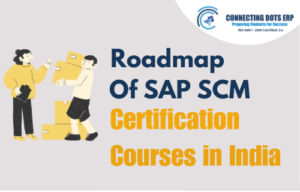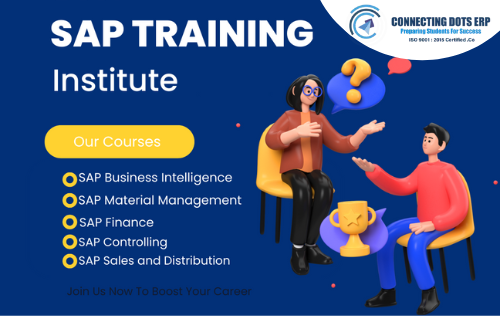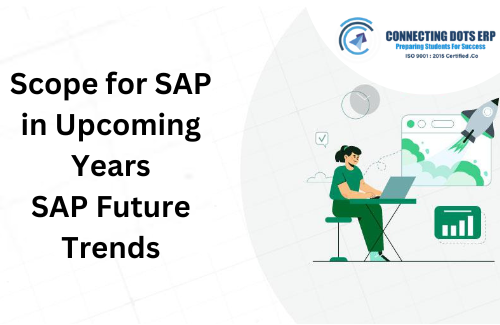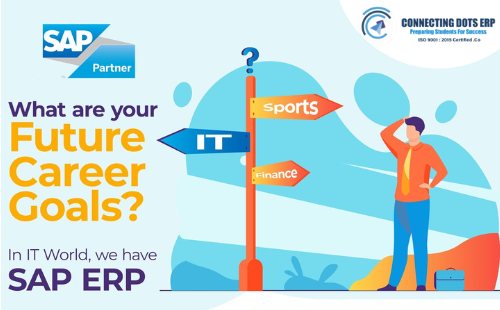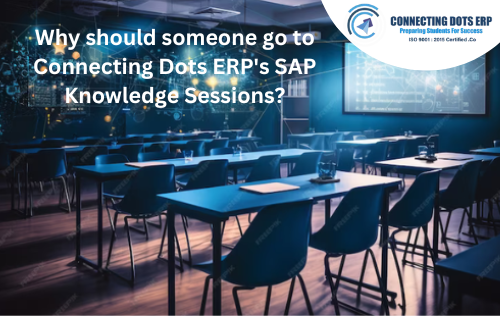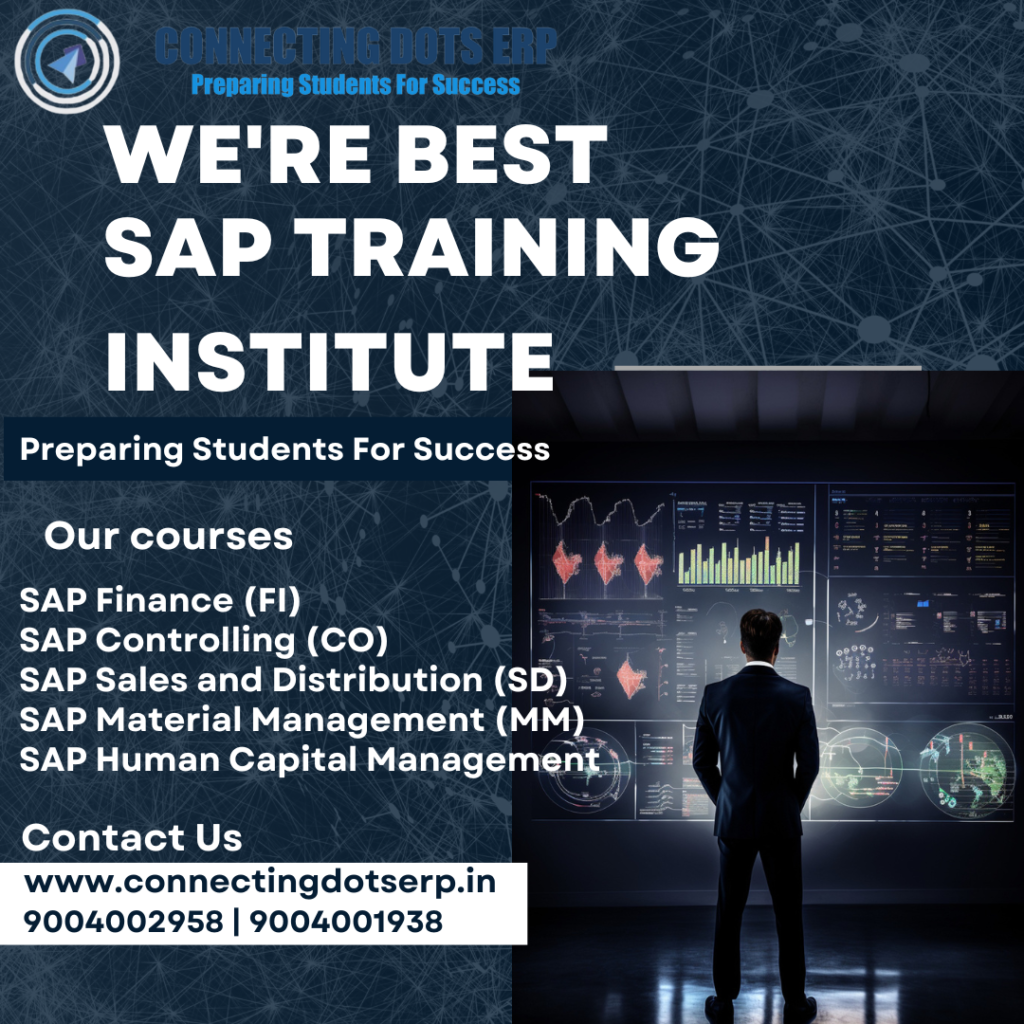According to the current growth in the market for SAP jobs, competition is fierce in this particular industry. Clients typically have a selection of various candidates at each specific SAP location. Candidates who wish to advance their career in SAP must do so to differentiate themselves from the competition and increase their chances of being selected for an SAP post. The most rewarding jobs require the greatest amount of work, commitment, and research, along with the flexibility to adapt to changing circumstances. These are SAP roles. They have to keep up with what the labour market is demanding.
Registration Link: https://connectingdotserp.in/
Call Now: 9004002958 / 9004001938
Methods To Boost Your Prospects of Getting Hired for an SAP Position
Create A Network
In the upcoming years, it will make sure that SAP work doesn’t disappear. You should always keep in touch with your former coworkers. Keep participating in various SAP networking events and conferences will help you forge new connections. For SAP professionals, there are many social media platforms available right now that you may use. They will help you to improve your chances of being hired for a potential SAP position. A crucial networking tool for SAP consultants is social media and sites like LinkedIn.
The SAP community network, or SCN, is another well-known online community of SAP experts. By adding blog posts, comments, and SAP advice to this community, you may contribute to it and raise your standing. Candidates can expand their networks by using Google Plus, Twitter, and other social media platforms. Learning new things is always important, but keeping a professional network active is also helpful.
Choose the Best SAP Recruitment Agency
The majority of SAP consultants will only be able to get employment through recruitment agencies, thus it is always crucial to select the best one. Your talents will assist the proper recruitment agency place you in the best SAP position. It is advised to choose a few reputable agencies, work with them, and always keep them informed of your CV, current contact information, and availability. Your thoughts on the recruitment firm may be plagued with the following queries:
Is SAP a speciality of the agency?
Does the location you want to work in receive any special attention?
Do they perform their work at fair prices and profit margins?
Has the hiring company had a good reputation in the SAP community?
Will the company represent you with professionalism and decency?
There are many reputable recruitment firms with several sap jobs in high demand.
Registration Link: https://connectingdotserp.in/
Call Now: 9004002958 / 9004001938
Create an Appealing CV
To build a successful SAP career, you must produce a strong SAP CV. It is the cornerstone for creating a successful SAP career. Your CV is the first thing an employer will look at when you are looking for a new SAP job opportunity to determine whether you are qualified for the role or not.
Along with this, there are a few other criteria that must be met to increase your chances of landing an SAP position. This includes having a solid understanding of business processes, having strong configuration abilities, and participating in the SAP Community Network.
Follow the Newest Developments
With the dynamic and competitive nature of the SAP employment market, it is necessary to maintain your technical skill. Match your educational background, and certification in line with emerging trends in technology. Attending the training sessions and pursuing the SAP certifications and other industry-related skills can help you improve your comprehension. Possessing knowledge of the most recent SAP releases and upgrade packs will always be beneficial. The new SAP success will always result in more demands because of the restricted resources available. Getting familiar with the most recent SAP products in particular will always be helpful. Thus, the SAP consultants must keep an eye out for new goods and sectors where the SAP is active.
The most recent advancements are open to SAP clients, who will soon want SAP consulting, in a very short amount of time. You will appear to potential SAP employers as being the most attractive if you have experience with SAP HANA and HANA-related skills, such as SAP S/4HANA Simple Finance. By attending SAP conferences like Sapphire and SAP TechED, any SAP consultant may stay current on the most recent developments in the SAP industry. A good way to keep up with the most recent SAP news is also to subscribe to an RSS news feed.
Develop Impressive Communication Skills
Your ability to communicate is a key factor in work success. As a result, it must be overlooked that communication skills are also crucial. The ability to communicate well may not come to everyone; it depends on the environment and the environment’s resources. A person ought to always make an effort to improve their communication abilities if they don’t already have them.
An SAP consultant should be able to speak in both business and technical languages besides being fluent in English. The consultants are expected by the clients to communicate with them in commercial terms. Possessing strong communication abilities and the ability to speak many languages might help an SAP employer become even more appealing. English has now taken over as the universal business language, including SAP.
To communicate more when advising on SAP actions, you can perform the following:
Give some depth to your arguments.
Give a comprehensive explanation by taking your time.
Be specific with your recommendations and list the essential measures that must be taken.
Understand your listener’s needs and how to communicate with them through listening to them.
Make sure to master the technical and business language used by SAP in your industry as part of your professional growth. You should be able to know and be able to converse in the technical language used by your clients while you are working with them.
Registration Link: https://connectingdotserp.in/
Call Now: 9004002958 / 9004001938
Stay Informed with SAP’s Latest Developments
Keep your abilities, credentials, and technical knowledge up to date if you want to succeed in a dynamic and competitive employment market like SAP Consulting. Attend training courses during your free time, and focus on obtaining SAP certifications and other professional credentials.
Experience with recent SAP versions and upgrade packs is always helpful.
With a limited quantity of resources, new SAP acquisitions result in increased demand. Early exposure to new SAP Products can benefit you if they complement your current area of expertise within SAP. SAP Cloud-related fields like SAP Business By Design are now in great demand.
Tackling A Problem from All Sides
You may work for a variety of clients throughout a successful SAP career. It ranges from start-ups to large corporations, and in a variety of different industries. So you must view issues from several perspectives. The more adaptable you are in your learning, the easier it will be for you to apply what you have learned to new tasks for various clients.
Think about how the issue would apply in a different industry while you are solving a problem. If you already know what company you want to work for next, this is very crucial. You will increase your chances of succeeding if you conduct repeated analyses of the problems.
Create Your Brand
Today, developing a long-lasting SAP career is as much about personal branding and self-promotion as it is about skills and competencies. Given the level of competition present, what will make you stand out from the crowd? This is how you advertise yourself to the professional community.
Make sure you understand how to establish your profile both online and offline because personal brands are getting more diverse in the digital age. Here are some useful tricks for doing it:
Use several social media platforms for a variety of goals (LinkedIn for professional branding, Twitter for industry knowledge, and Facebook for revealing a little bit about yourself and your personality).
Join communities for professionals and take part in discussions within them.
Start a blog to show your expertise in the field by offering the best guidance and information.
Create a network of contacts with other experts in your field.
Maintain a constant tone and message.
Registration Link: https://connectingdotserp.in/
Call Now: 9004002958 / 9004001938
Talk About Your Expertise
Being able to contribute value to others in your field and be in demand as a professional is essential. Be sure to share your extensive knowledge of SAP and its various modules with other professionals, whether it be through a blog article or a straightforward LinkedIn post.
When you are seeking to progress your career and take on a more senior position, sharing knowledge is very crucial. You can gain respect from your peers and an opportunity to advance in your profession. Demonstrate to them that you are well-versed in understanding a particular SAP module or issue in question.
Choose A Mentor
Find a senior SAP consultant if you work for an SAP consultancy and ask them to be your SAP mentor. With the right SAP mentor, you can learn how to handle the obligations that come with becoming an SAP consultant.
If you happen to be an SAP BASIS consultant, these tasks may include setting up Purchasing Organisation settings within the SAP IMG, establishing Master Data, and database performance tuning.
Another important responsibility that you will be given is data management. For instance, you’ll be able to create reliable systems that are simple to maintain and scale by understanding the significance of system-wide naming rules and standards. It helps to have access to an SAP Developer System as well because you need to do experiments in that environment to find the answer.
Become SAP Certified
Get SAP certified for your module and business process expertise if at all possible. Many people might disagree. For instance, while it is possible in theory to study SAP BPC on their own, you should consider formal instruction. If you want to advance your career as an SAP Consultant, in the middle of your career, you should consider Business Process Management skills as a core add-on.
Develop A Business Case by Knowing How to Do So
An SAP functional consultant’s job is to assist the client in increasing their profits, regardless of whether you are technical with an emphasis on ABAP abilities.
There are several courses you can take online to get you up to speed if you don’t already have a basic understanding of money.
You will find a wealth of resources if you search for financial expertise. If you are interested in knowing whether SAP has a future, this is one of the most crucial skills to grasp.
Get An Extensive Awareness Of The SAP Implementation Methodology
Gaining skills in SAP Solution Manager, PMP certification, ASAP certification, and SAP Activate is also recommended. RDS (Rapid Deployment Solution) approach: learn how to use it and when.
Read the many documents that are already there before delving deeper into each form of implementation. The extent to which the difficult work has already been completed for you may surprise you.
Gain Real-World Industry Experience
You will realise that SAP Business Processes make a lot greater sense to you if you can become a SAP consultant without any prior work experience.
Registration Link: https://connectingdotserp.in/
Call Now: 9004002958 / 9004001938
Become An Effective Team Player And Team Leader
If not, there are several chances to lead and be led. Any interest in outdoor adventure training? Prepare yourself to work long hours. Before they can execute at the highest level, the majority of SAP consultants, entry-level SAP consultants, must need years of experience. That is the distinction between an end user and a consultant. Lengthy hours, experience, education, and competence in a broad range of business processes, project contexts, and industry verticals.
Considerations To Make When Selecting the Top SAP Careers
- Jobs
As you choose from the top SAP positions, keep an eye out for openings in your neighbourhood. The demand for your services or the payment you receive as a service provider must be understood. The list of the top SAP careers will then be whittled down, and the others will be crossed off.
- Academic And Professional Backgrounds
Working in a field that interests you (and that you are more familiar with) is beneficial and fun regardless of your level of experience. Both your profile and your experience as an SAP professional, a trained/experienced SAP professional are strengthened. They improve through your academic training or professional experience in a particular field.
- Life And Career Goals
As your life goals determine your success in any work path, so do these. When choosing the right SAP module, you must not lose sight of your genuine intentions, whether they are to work or not. Your passion and your life’s objectives need to work together. Are you motivated to work? If so, explain why and what motivates you going forward. The desire to work hard and get better, money, or reputation?
Best SAP Certification For Beginners
For many businesses that need to manage logistics, finances, manufacturing, inventory, and other areas, SAP is the go-to ERP (enterprise resource planning) software.
It should come as no surprise that a lot of businesses are seeking applicants who are not only fluent in SAP but also have learned how to use it. They must know how to boost productivity, cut expenses, and streamline company processes.
Getting an SAP ERP certification is one of the finest methods to show off your expertise in SAP. Although there are approximately 150 certifications available for a range of topics and skill levels, it might be difficult to decide which one to pursue.
1. Reporting, Data Acquisition and Modelling with SAP BW/4HANA 2.x
SAP Certified Application Associate – Reporting, Modelling, and Data Acquiring with SAP BW/4HANA You can learn reporting, Modeling, and data collection with SAP BW/SAP HANA in this introductory-level course, 2.x certification. By analysing data from various sources, such as databases or spreadsheets, you will use this SAP certification to optimise the business processes of the organisation.
Registration Link: https://connectingdotserp.in/
Call Now: 9004002958 / 9004001938
2. SAP Commerce
The amount of specialist Your knowledge and technical abilities are validated by your SAP Commerce Certification to serve in a role supporting SAP Commerce products. It enables you to make the most of your expertise in CRM, ERP, and other business procedures. Hands-on training will be given for SAP Commerce on a range of topics, such as configuration, product support processes, troubleshooting, integration, and general assistance.
3. SAP HCM (Human Capital Management)
A comprehensive and integrated collection of tools are available through SAP’s Human Capital Management certification to assist you in managing your workforce. With SAP HCM, you can strengthen your essential HR procedures, which will boost employee productivity.
Through the certification, you can use the module to get important business results. It includes decreased planning errors, improved HCM procedures, operational cost reductions, and increased margins with potent personnel intelligence. The knowledge and abilities required to develop and maintain SAP’s top human capital management technology are possessed by HCM-certified specialists. It is appropriate for professionals seeking to specialise in human resources or talent management.
4. Supply Chain Management Using SAP S/4HANA Cloud
The SAP S/4HANA Cloud: Supply Chain Management certification serves as an associate-level intelligent demand forecast that verifies a candidate’s awareness of the SAP Activate onboarding process and essential supply chain knowledge.
It gives important insights into customer activity across channels at any time of day or night. Also, it offers SAP HANA-driven analytics integration with enterprise data sets. By earning an SAP Supply Chain certification, you will learn advanced skills in subjects.
5. SAP Activate Project Manager
Among associate-level credentials, the SAP Activate Project Manager credential is one of the most sought-after. Through real-world assignments, it aids in developing your foundational consulting abilities and experience. It is crucial to keep projects on track, on budget, and in compliance with organisational norms. So, a management career that has earned the SAP certification calls for multitasking prowess and high degrees of adaptability.
The certification confirms the candidate’s fundamental understanding of SAP project management, aptitude for using SAP Activate Methodology, and capacity to handle internal and external stakeholders.
Registration Link: https://connectingdotserp.in/
Call Now: 9004002958 / 9004001938
Conclusion
These techniques and their implementations are continually changing in tandem with the business environment. With 200 million users, SAP leads the enterprise resource planning (ERP) market. SAP is a well-designed programme that unifies management within and outside of a business. Finance, manufacturing, sales, and human resource management are all included. Maintaining information flow throughout the company is SAP’s main objective.
Regardless of industry, SAP offers applications to a wide range of enterprises. Stated differently, to possess direct experience utilising SAP Study the industries where SAP demand is strongest, then finish your training. Industries are beginning to use cloud storage as a reliable and secure way to store critical data. SAP is the hottest career right now, and it will be for the foreseeable future.



